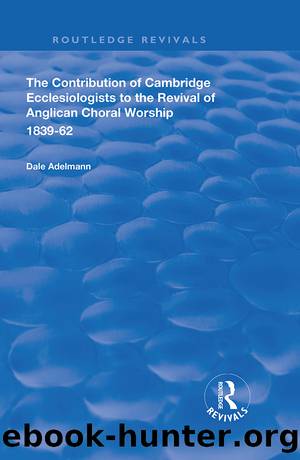The Contribution of Cambridge Ecclesiologists to the Revival of Anglican Choral Worship, 1839-62 by Dale Adelmann

Author:Dale Adelmann [Adelmann, Dale]
Language: eng
Format: epub
ISBN: 9781138340343
Barnesnoble:
Publisher: Taylor & Francis
Published: 2019-06-05T00:00:00+00:00
St Augustineâs Missionary College, Canterbury
The first of Hopeâs major benefactions to the Church of England was the reconstitution of St Augustineâs College, Canterbury. Hope bought the site in June 1844 after reading a letter to the editor of the English Churchman (13 September 1843) from Robert Brett of Stoke Newington, in which Brett hoped that God would âdispose some pious and wealthy Catholic to purchase and restore the sacred edificeâ, which at the time was being used as a brewery. Hope bought it for the use of the Church, engaged Butterfield as architect, and, encouraged by the Revd Edward Coleridge, master of Eton, decided to make it into a theological college for missionaries. The consecration of the buildings took place on St Peterâs Day (29 June) 1848. Afterwards the group of select guests moved from the small chapel of the College to Canterbury Cathedral, where a congregation of 2000 people, including six hundred clergy, had assembled to celebrate the event. The list of notables in attendance reads like a âWhoâs Whoâ of the Victorian High Church; Benjamin Webb noted in his diary, âMet nearly everybody one knew.â103 The University of Oxford granted Hope an honorary DCL in gratitude for this generous benefaction to the Church. Among all the honorands at the degree ceremony, his name is reported to have âelicited decidedly the loudest and the heartiestâ cheers and applause, and an allusion to St Augustineâs brought forth âa burst of approbation that told more forcibly than words the deep gratitude felt for his liberality and the good wishes with which his pious work was regarded.â104
Already in June 1845 Hope had tried to persuade Benjamin Webb to become a fellow of the College, writing to him:
It will be the very place for you, and consider the mediaeval influences among which you will live and the opportunities which you will have of following ecclesiological and ritual studies to so much more advantage than if engaged in parochial duties, and daily choral service in choir and weekly Communions which are purposed.105
Hopeâs biographer suggests that Webb declined because of his secret engagement to Maria Mill, but Webbâs diaries would seem to indicate that the engagement did not take place until June 1846. More likely Webb declined because of his youth and a humble sense of inadequacy for the task, a sensewhich cannot but have been strengthened by the fact that J.M. Neale was âindignantâ at the very idea. Hope tried to reassure Webb:
you have what is of more importance than book-learning, which is the Catholic tone. Just look at yourself and ask if you are not a mediaeval Fellow - I do not mean an antiquarian, but one who will try to develop present times by the help of our inheritance of ancestral holiness and faith. We want such as you to give the tone to our college.106
Webb never accepted a fellowship, yet these lines are important for what they reveal about Hopeâs vision for the College and his mutual identification with Webb in
Download
This site does not store any files on its server. We only index and link to content provided by other sites. Please contact the content providers to delete copyright contents if any and email us, we'll remove relevant links or contents immediately.
The Goal (Off-Campus #4) by Elle Kennedy(13678)
Kathy Andrews Collection by Kathy Andrews(11839)
Diary of a Player by Brad Paisley(7584)
Assassin’s Fate by Robin Hobb(6224)
What Does This Button Do? by Bruce Dickinson(6208)
Big Little Lies by Liane Moriarty(5806)
Altered Sensations by David Pantalony(5106)
Pale Blue Dot by Carl Sagan(5012)
Sticky Fingers by Joe Hagan(4204)
The Death of the Heart by Elizabeth Bowen(3625)
The Heroin Diaries by Nikki Sixx(3552)
Confessions of a Video Vixen by Karrine Steffans(3311)
Beneath These Shadows by Meghan March(3309)
How Music Works by David Byrne(3272)
The Help by Kathryn Stockett(3150)
Jam by Jam (epub)(3095)
Harry Potter 4 - Harry Potter and The Goblet of Fire by J.K.Rowling(3076)
Computational Linguistics and Intelligent Text Processing: 20th International Conference, CICLing 2019 La Rochelle, France, April 7â13, 2019 Revised Selected Papers, Part I by Alexander Gelbukh(2995)
Strange Fascination: David Bowie: The Definitive Story by David Buckley(2872)
